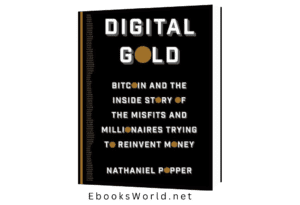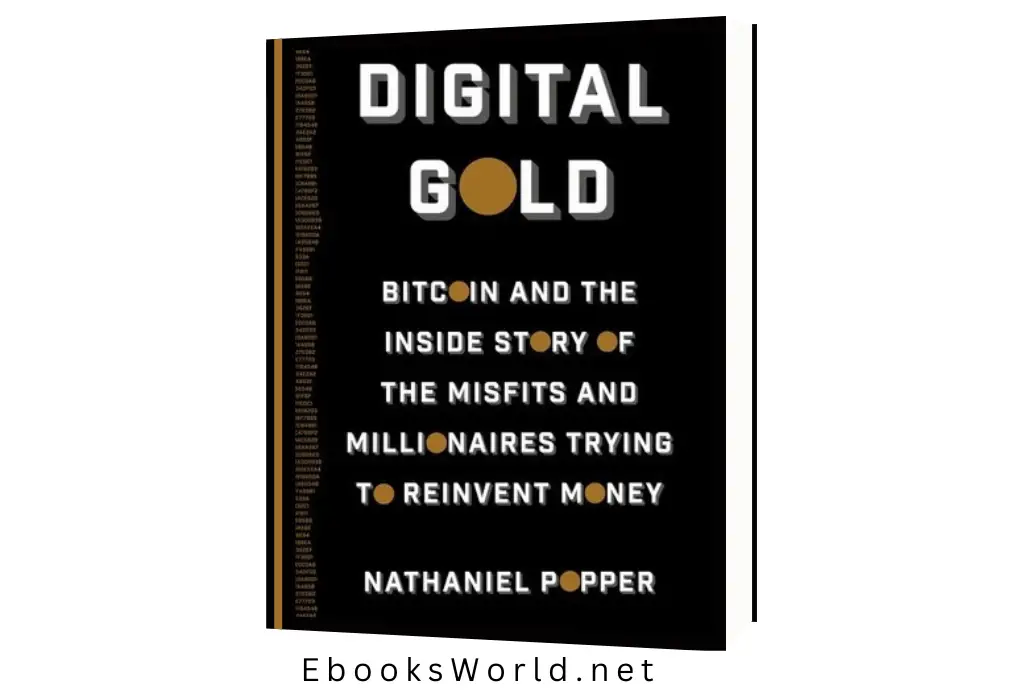Digital Gold: Bitcoin and the Inside Story of the Misfits and Millionaires Trying to Reinvent Money

Ratings
“Digital Gold: Bitcoin and the Inside Story of the Misfits and Millionaires Trying to Reinvent Money” is a compelling book written by Nathaniel Popper that delves into the fascinating and turbulent history of Bitcoin. Published in 2015, the book provides a comprehensive account of the people, events, and ideas that shaped the development of the world’s first decentralized cryptocurrency.
Overview:
The book begins by introducing the reader to Bitcoin’s mysterious and pseudonymous creator, Satoshi Nakamoto. Nakamoto’s white paper, titled “Bitcoin: A Peer-to-Peer Electronic Cash System,” outlined the vision for a digital currency that operates on a decentralized network, eliminating the need for intermediaries like banks. The narrative then unfolds, chronicling the journey of Bitcoin from its inception in 2008 to its growing prominence in 2015.
The Early Days:
The book vividly describes the early days of Bitcoin, where a small community of passionate individuals, often labeled as misfits, hackers, and libertarians, gathered online to contribute to the development of this groundbreaking technology. It explores the challenges faced by these early adopters, such as skepticism from the traditional financial sector and legal uncertainties surrounding the use of a digital currency.
The Rise of the Miners:
One of the key components of the Bitcoin network is the process of mining, where individuals, known as miners, use powerful computers to solve complex mathematical problems and validate transactions. “Digital Gold” explains the significance of mining in securing the network and the emergence of mining pools, where miners collaborate to increase their chances of earning Bitcoin rewards.
The Silk Road Connection:
The book delves into the controversial association between Bitcoin and the Silk Road, an online marketplace known for illegal transactions. Popper explores how Bitcoin became the preferred currency for these transactions due to its pseudonymous nature and the absence of centralized control. The narrative raises ethical questions about the role of Bitcoin in facilitating illegal activities and the broader implications for its reputation.
Mt. Gox and the Dark Side:
“Digital Gold” covers the infamous Mt. Gox exchange saga, where a significant portion of the world’s Bitcoin transactions took place. The collapse of Mt. Gox in 2014, due to a massive security breach, resulted in the loss of millions of dollars worth of Bitcoin. This event underscored the challenges and risks associated with the nascent cryptocurrency market, raising concerns about the security and regulation of digital assets.
The Winklevoss Twins and Wall Street’s Interest:
The book introduces the Winklevoss twins, Cameron and Tyler, who gained fame through their legal battle with Mark Zuckerberg over the creation of Facebook. The twins later became early Bitcoin investors and advocates. “Digital Gold” explores how their involvement, along with increasing interest from Wall Street, contributed to Bitcoin’s mainstream recognition and acceptance as a legitimate asset class.
Regulatory Challenges:
As Bitcoin gained traction, governments and regulatory bodies around the world grappled with how to classify and regulate this new form of currency. The book delves into the legal and regulatory challenges faced by the Bitcoin community, highlighting the tension between the desire for financial innovation and the need for consumer protection.
Evolving Perspectives:
“Digital Gold” captures the evolving perspectives of key figures in the Bitcoin space, including developers, entrepreneurs, and early adopters. It explores the ideological differences within the community, ranging from those who see Bitcoin as a tool for financial empowerment and decentralization to others who view it as a means to disrupt and reshape the traditional financial system.
The Future of Bitcoin:
The book concludes by examining the uncertainties surrounding Bitcoin’s future, including ongoing debates about scalability, governance, and the potential impact of emerging technologies like blockchain. It reflects on the broader implications of Bitcoin as a catalyst for reimagining the concept of money and financial transactions.
In summary, “Digital Gold” provides a captivating narrative that goes beyond the technical aspects of Bitcoin, offering a human-centric account of the individuals and communities that played pivotal roles in its development. Popper skillfully weaves together the stories of misfits and millionaires, creating a narrative that is both informative and entertaining. The book serves as a valuable resource for anyone seeking to understand the history, challenges, and potential of Bitcoin and the broader cryptocurrency ecosystem.







